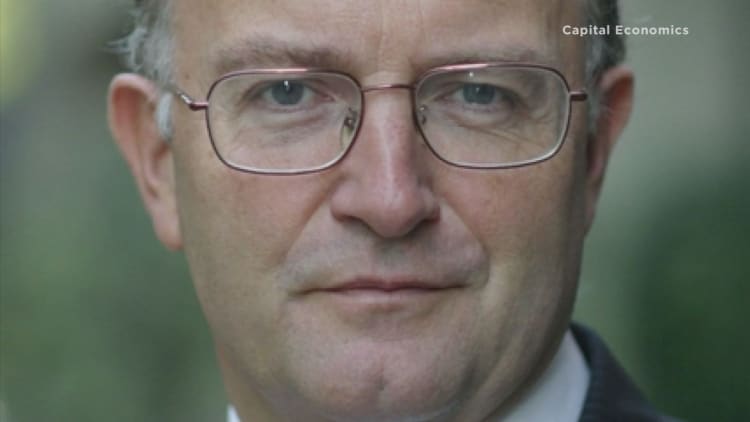
If the U.K. votes to exit the European Union, it's not Britain that will feel the pinch, euroskeptic economist Roger Bootle said Tuesday.
"We suspect that in fact the impact of Brexit has been much overdone by both sides in the debate and that the impact would be probably pretty close to zero compared to what GDP would have been. It's very difficult to say exactly which side of the zero line it would be," Bootle, executive chairman of Capital Economics, said at his company's conference in Singapore.
That compares with the U.K. Treasury forecast from April that U.K. households would be up to 5,200 pounds worse off per year by 2030 in a Brexit. The OECD in April estimated that the U.K. economy would be more than 3 percent smaller by 2020 than if the country remained in the EU and more than 5 percent lower by 2030. Earlier this year, the IMF warned that just the impact of the Brexit debate had shaved 0.3 percentage-point off the U.K. growth forecast this year. It later added that the British economy could contract by 1.5-9.5 percent over the longer term after a Brexit.
But Economists for Brexit, an eight-strong group of independent economists which counts Bootle as a member, forecasts an exit from the EU means blue skies ahead for the U.K., predicting increases in output and competitiveness.
One key argument for the remain camp is that an exit would mean leaving the 28-nation EU, and untangling a host of complex trade and other deals that tie the country to the European bloc. Those agreements were not easy to make, and they would be exceedingly difficult to redesign or renegotiate.
But Bootle shrugged off predictions that a Brexit would damage the U.K.'s ability to trade with Europe, saying that the share of U.K. exports going to the EU has been falling for a long time and would continue to fall, whether or not there's a Brexit.
"[That] means all of the various horror stories that people paint about what might happen if Britain left the EU, to the extent that there's something in them, then their relevance or their strength has been diminishing," he said, adding that the tariffs the EU imposes on imports from outside the bloc are only around 3 percent on average.
Bootle also didn't put much credence in predictions that London would lose its relevance as a financial sector, noting that within Europe, there isn't much competition for the role, with Frankfurt "boring" and Paris suffering from a high tax rate.
A vote to exit would not mean much of a change at all for the U.K. for a very long time as well, Bootle said, noting that under the current treaty, Britain would have two years to negotiate the terms of the exit with the EU.
He speculated that the U.K. could begin the talks, wait until a deal is close and then invoke its right to exit, stretching the period of negotiations to longer than two years. He didn't comment on whether or why the EU would be willing to engage in a long-term discussion of a divorce while the U.K. was still cohabitating with the bloc.
But while he didn't see a downside to Brexit for the British -- or at least the British who weren't enjoying the EU-sanctioned ability to live and work in other EU countries or those don't wish to later -- Bootle expected that Europe would take a hit. According to U.N. data, more than a million British are living in other EU countries.
"If the U.K. voted to leave, all sorts of added pressures will fall on the other countries," he said, noting that Britain contributed about 9 percent of the EU budget and that the burden of picking up the slack would fall heavily on the rest of the bloc.
Bootle also expected that if the U.K. shut its doors to most immigration from other EU countries, the level of migration to the rest of the EU would rise, citing the region's "considerable anxiety" over immigration.
"There will probably be calls to EU referendums in other EU countries, most likely Holland and Sweden," he said. "Brexit could provide the trigger for another bout of euro zone crisis involving possibly Italy or Greece or both."
When it comes to the immediate market impact, however, Capital Economics expected the pound would fall sharply on a vote to exit, but that gilts and stocks could easily rise. To be sure, rising prices of gilts would likely be an indicator that the market is seeking a safer haven out of fear, which suggests U.K. stocks would fall.
Whether the U.K. would go with Brexit or Bremain remained a toss-up.
Polls have been extremely close and have been fluctuating. The latest Financial Times poll of polls Monday evening showed 45 percent would like to leave and 43 percent want to remain. The poll of polls been at a dead heat earlier in the day, but had favored exiting over the weekend.
The latest ICM poll Monday showed an increase by those that want to leave. Another poll, the ORB in The Telegraph, showed 49 percent want to leave, and 48 percent would prefer to remain, while a third poll in The Times YouGov poll had 46 percent voting to leave with just 39 percent for remaining.
It wasn't clear how many, if any, of the polls included British voters living elsewhere in the EU.
—Patti Domm contributed to this article.
Follow CNBC International on Twitter and Facebook.
—By CNBC.Com's Leslie Shaffer; Follow her on Twitter @LeslieShaffer1


